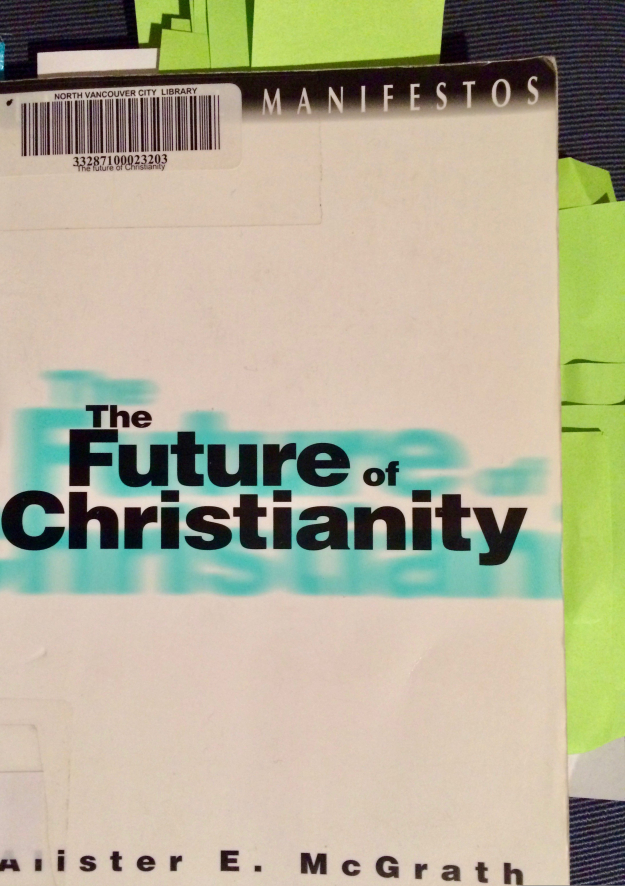
What a good book! On April 8th while attending The North Shore Writers’ Festival luncheon circle with authors, I noticed a display of books near the door to the room. It was the week before Easter and there was an eclectic display of Christian books on various topics. I signed out “The Future of Christianity” by Alister E. McGrath.
I knew of the trusted Prof. McGrath from Oxford University through my years of part-time study at Regent College, UBC. A couple of weeks later as I started reading the book I was hooked by his bringing together of historical and political facts as precursor to the current unsettled condition of the Western church. My curiosity was piqued to read his take on the ways the church is changing and how to position myself to accept reasonable adjustments in the way we do church going into the future.
This is not a review or a summary. Upfront I want to say, I cannot do this book justice, but will only highlight a few things for readers to be encouraged in the way forward. As St. Benedict said, we are always beginners. There is much to know. This is the main thing I learned at seminary. The Gospel remains the same but the Christian in the world changes over time and culture.
So one thing is for sure, in order to understand the way forward, we need to know where we have come from and where we are right now. Dr. McGrath is particularly effective in pulling together the big picture of the church in culture and defining the essence of where the church is now across the globe. The following is a remnant of what can be feasted on in this book written for scholars and not.
There is much history of how things with Christianity in all its forms got the way it is today. One thing I noted was of McGrath’s explanation of a major factor affecting the church during WWII was in Hitler presenting his ideas to the church as a renewing of German culture. Sadly, and a warning for us, is that eventually the church became so much like the culture that it could not critique it with the noted exceptions of writers Karl Barth and Dietrich Bonhoeffer.
After the shock of the wars, there was a spiritual vacuum, leading to the ‘Death of God’ movement in the 1960’s and other factors. Many thought that Christianity would be no more: “This surge of enthusiasm often led to the suspension of any critical faculties… The sweeping aside of traditional morality was seen as purely liberating at the time. It was fun to be able to sleep with whoever you liked and do whatever you pleased. It all seemed so innocent. The darker side of things was there to be seen… the truth could not be suppressed forever… decriminalization of paedophilia.” One can easily fill in the blanks of the long ranging effects of this movement in Paris. A long litany of historical events, large and small, illustrates the results of the: “rupture of the centuries-long cycle of intergenerational transmission of the Christian faith.”
Even some uncritical theologians abandoned the faith and former Christians “thinking Christianity had nothing to offer in relation to the supernatural of mysterious” were attracted to New Age practices. Add to this the fact that the “Enlightenment lost any remaining credibility” with its “demand that everything should be neatly ordered, rational, and logical” and you have the perfect storm that led to Postmodernism.
Christianity has now been commodified and marketed as a spiritual product: “A successful church was now seen as a church that grew” so that “Western churches outreach” was seen as the “McDonaldization of Christianity.” “Efficiency, calculability, predictability and control” now informed the model. Yet there remains: “a longing for spiritual authenticity.”
In my oversimplified and truncated picture of events there is seen the result that Christianity remains the largest religion in the world. As it cooled in North America and Europe, faith has spread like wildfire in Asia, Africa, and Latin America – so much so that they send missionaries now to re-invigorate personal faith in the West. It is a grand story and McGrath tells it well. Much of his forth-telling of possible future trends is unfolding now – a full 15 years after his book was written. Of note are his descriptions of how each strand of Christianity can continue to right itself to face a drastically changing world with the unchanging Gospel told and lived in both new and ancient ways.
There is a move toward forming Christ-centred community churches that care for the people around them over churches that do not attract by their denominational differences and doctrinal squabbles. The Bible is paraphrased informally to include the unchurched. McGrath relays the thought that rather than more academic theologians, what the world needs now, is a movement of amateur theologians: novelists like C.S. Lewis and Dorothy L. Sayers etc. He says that some of the American megachurches are becoming like the “medieval monasteries plant[ing] smaller monasteries in outlying regions, resourced by the mother house until they were deemed strong enough to be self-sufficient.” He states: “The future of Christianity will be deeply shaped by this major new trend.”
Enough said. Actually, God is very much alive. There is the necessity though that churches get with the program that God has. What is the Spirit saying to confused churches in this so-called post-Christian cultural mash-up? Jesus came that we might have abundant life. He also turned culture upside down – especially for and by God’s people. Isn’t confusion one of the precursors of change?
Advertisements Share this:




